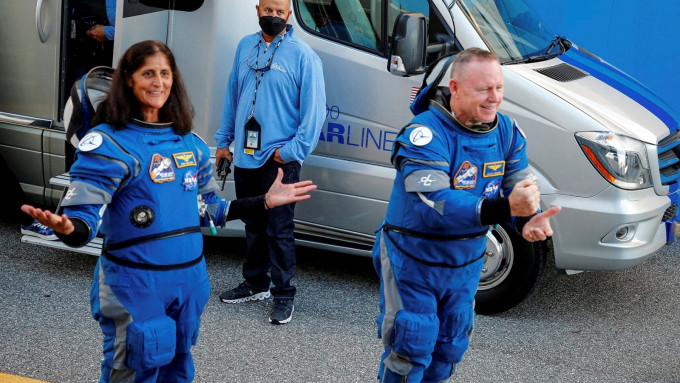What happens to the body if you get stuck in space for over a month, like Indian-origin astronaut Sunita Williams?
Imagine being stuck in space – the vastness around you breathtaking but the environment posing a constant threat to your health. This is the reality for astronaut Sunita Williams.
Sunita, accompanied by Barry Wilmore, is experiencing a longer-than-expected stay aboard the International Space Station (ISS) due to a technical issue with their transport spacecraft. The spacecraft originally intended for an eight-day mission, launched on May 25th. However, a minor helium leak forced a delay in its journey to the ISS. Despite the setback, the spacecraft successfully docked with the station on June 6.

While the astronauts are safe and well on the ISS, their return trip is currently on hold. Steve Stich, manager of NASA’s Commercial Crew Program, stated, “NASA is taking our time and following our standard mission management team process.”
The absence of gravity in space wreaks havoc on bodily fluids. Normally, gravity keeps fluids distributed evenly. However, in microgravity, fluids shift upwards, causing potential issues for the kidneys – our body’s filtration system. According to Dr Jayant Kumar Hota, Senior Consultant Nephrologist, Indraprastha Apollo Hospital, this can lead to:
Fluid Imbalance: The kidneys struggle to maintain proper fluid balance, potentially causing dehydration or fluid overload.
Kidney Stones: Increased calcium excretion from bones due to microgravity raises the risk of kidney stones, which are painful and can be difficult to manage in space.
Chronic Kidney Disease: Radiation exposure, a constant threat in space, can damage kidney cells and tissues, increasing the risk of chronic kidney disease.
 NASA astronauts Barry Wilmore and Sunita Williams gesture at NASA’s Kennedy Space Center, ahead of being launched to space. (Source: REUTERS/Joe Skipper/File Photo)
NASA astronauts Barry Wilmore and Sunita Williams gesture at NASA’s Kennedy Space Center, ahead of being launched to space. (Source: REUTERS/Joe Skipper/File Photo)
The dangers of a delayed return
If Sunita Williams’ return is delayed, the health risks worsen every day, more than the kidney issues, according to Dr Rakesh Gupta, Senior Consultant, Internal Medicine, Indraprastha Apollo Hospitals:
- Persistent Fluid Imbalance: Continuous fluid redistribution can lead to chronic dehydration or fluid overload, with long-term consequences.
- Muscle and Bone Loss: Microgravity weakens the skeletal system and muscles due to the lack of constant gravitational pull.
- Fluid Redistribution: This can cause puffy faces, increased intracranial pressure, and potentially affect vision and cognitive function.
- Radiation Sickness and Cancer: Cosmic radiation exposure increases the risk of cancer and acute radiation sickness.
- Mental Health Concerns: Isolation, confinement, and the high-risk environment can negatively impact mental health.
- Weakened Immune System: Astronauts become more susceptible to infections due to a compromised immune system.
According to Dr Shruti Sharma, Consultant – Internal Medicine, Yatharth Super Speciality Hospital, Noida Extension, there are some sensory and neurological challenges involved too, such as disruptions in spatial orientation, balance, and eye-hand coordination. These can lead to Space Motion Sickness (SMS). Cardiovascular strain, metabolic changes, and alterations in hormone levels and gut microbiota composition further complicate health risks, she said.
Combating the challenges
Drs Hota, Sharma and Gupta shared some strategies to mitigate these risks:
- Exercise Regimen: Regular exercise using specialised equipment helps maintain muscle mass and bone density.
- Dietary Planning: A well-planned diet ensures adequate nutrition for overall health.
- Managing Fluid Issues: Specific exercises and lower body negative pressure devices can help counteract fluid redistribution and intracranial pressure.
- Radiation Protection: Scheduling spacewalks during low solar activity and using spacecraft shielding minimizes radiation exposure.
- Psychological Support: Regular communication with family and mental health professionals, along with recreational activities, help manage stress and maintain mental well-being.
- Medical Monitoring: Continuous monitoring allows for early detection and treatment of health issues.
While these countermeasures are crucial, a prompt return to Earth is essential for long-term health. With a prolonged stay, the cumulative effects of these health risks can have severe and potentially irreversible consequences, said Dr Kumar.
Disclaimer: The copyright of this article belongs to the original author. Reposting this article is solely for the purpose of information dissemination and does not constitute any investment advice. If there is any infringement, please contact us immediately. We will make corrections or deletions as necessary. Thank you.

